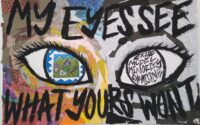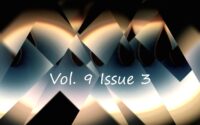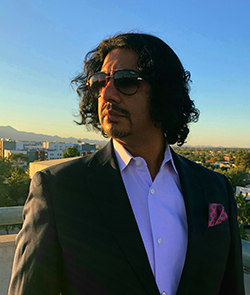A Shared Dream: A Letter to My Son Ricardo about Silencing and BIPOC Futurity in the Academy
My dear Ricardo,
When I decided to return to graduate school, I had you in mind. Long before I was your father, I was a kid with a dream inconsistent with this world. Folks around my way didn’t dream of a degree from a four-year university, let alone a doctorate in an obscure area like Rhetoric and Composition Studies (ghettos like mine have a way of devouring dreams). My dream began with encouragement from Krista Ratcliffe at Marquette University and an introduction to the writing of—and later, the writer—Victor Villanueva. Ultimately, I did what was necessary: I abandoned that dream, along with writing, for law. This one shot is about more than me, was my rationale as a young, first-generation—first-everything—Mexican American student who balanced naivete, love, and fear. Loss and life provided perspective; my parents passed shortly after you were born. What you knew of them came through photos and stories, and what you knew of me, beyond being Dad, came through opaque abstractions like counsel and community leader. You came to know a new abstraction, writer, and I came to know that I still carried that dream.
What would you carry throughout your life if you shared in my dream?
That answer held such promise. Being joined at the hip by virtue of single parenting and student poverty heightened that promise. I so wanted to inspire you. I still do. My educational journey gave me a particular freedom; your journey, I believe, will give you that freedom, too. As we approach graduation, I feel the need to write this letter to you. Living this shared dream confronts us with truths about futurity, mine and, more importantly, yours.
One of those truths, the one that concerns me deeply for you now and for who you must be, is a particular problem of silencing in higher education for individuals racialized as people of color.
The subject of silencing is nothing new, or simple, for us. Since you can remember, I have had to have conversations with you about the experiences that you witnessed through me and the expectations that I knew came with those experiences. Those conversations bore an additional weight where our identities as single cisgender father and sole cisgender son intersects with our identities within Latinidad, a convoluted cultural diaspora that involves multiple racial hierarchies. People reminded us that your flesh-and-blood father is “different” from you, and that difference, his dark skin, his thick, wavy hair, his physiognomy, spoke to a world defined by anti-Latino hatred as well as anti-Muslim and anti-Black hatreds. Worse, your skin, hair, and physiognomy mirrored that of many of these very people. These experiences occurred in spaces—professional, civic, communal—defined by its investment in an invisible norm of whiteness, whether that of the United States or Latinidad or both. Our conditional existence involves our complicity, which begins with our silence about racism.
I was not naïve about academia. I lived the conundrum of racelessness and fictive kinship that Signithia Fordham describes (“Racelessness,” 55-63, 79-80), and I identify with the fear and courage of the warrior who shares in the “war against the tyrannies of silence” of which Audre Lorde writes (“Transformation,” 41). I had good reason to believe that academia had changed. In convincing me to return to grad school, Victor Villanueva echoed themes of “community” and “kin” from his article on fictive kinship (“Of Kin,” 110). Others in the recruitment process did, too. And these words paralleled my experience at the University of Wisconsin Law School twenty years ago. I had little reason to doubt that you and I were entering a place of voice, community, and kinship—even less so with a program that trumpeted its focus on social justice and decoloniality and a school that boasted its new “Hispanic Serving Institution” designation in a border city.
Once we got here, we were taught our conditional status through the quiet ultimatum about the relationship between our silence and our future in the academy: keep silent about your experiences that contradict the institution’s ethos of diversity, inclusion, and equity for the sake of you and your future here.
It wasn’t long before you witnessed the experiences that prompted silencing. Some of these occurred in contact zones of graduate student life. Our first composition conference and a white graduate student’s outburst toward me hours after the keynote speech on genuine racial inclusion. CCCC in Portland and the anti-Muslim sentiments toward me throughout the city, crowned by the TSA ordeal. The parking lot near your school and news of my successful oral Comprehensive Exam defense interrupted by the white woman who called Tucson Police because I look dark, you pass as white, and our ten-minute public discussion meant human trafficking. And more. While I showed you how to stand unafraid, how to use effective rhetorical strategies, and how to speak beyond narratives of presumptive white innocence, and while I got resolutions—accountability, apology, change—I sensed something in you. Community involves tenets of identification, understanding, empathy, communication; the freedom to speak and the respect to be heard. When we returned to the graduate classroom together, we were reminded of our place. The majority of the people who touted anti-racist pedagogy, thumped Rhetorica in Motion, quoted Lorde about language and action, spoke of Spivak and subalterns, gave bell hooks a standing ovation—these very people met our experiences with aversion, diminishment, brow-beating, gas-lighting, among other rhetorical strategies that re-centered white fragility, comfort, and compliance. These people, determined, and destined, to be the faculty and administrators of tomorrow. These people, our community.
Some of these experiences—the more profound, disturbing, and dangerous—you witnessed through me, beginning with simple acts of agency appropriate for any graduate student. My letter to call for further consideration about a proposed program admissions policy with a de facto impact detrimental to BIPOC and LGBTQI students delivered through the English Graduate Union for the program faculty meeting. My request for historical information related to the CCCC Queer Caucus from the sole archive, the Caucus itself, upon suggestion from a Caucus member. My request for assistance from certain university leadership with an extension because of our program head’s pressure to finish my dissertation in one academic year despite the changes to my life after a heart attack and other serious health issues. My dialogue with upper leadership about insensitivity and inequity toward BIPOC prompted by the abrupt presence of said leadership in our student support group during the Summer of 2020. From these, you witnessed what any reasonable person would call unnecessary ordeals. My call-for-further-consideration letter met with an implication and, then, silence: the union representative and others informed me that the very faculty member who gave me and others in my class the proposal implied that I took the proposal off the copier at the faculty meeting, and the faculty and administrators present did not offer me a word of personal support despite the magnitude of such an implication for any BIPOC student. My archival request met with actions described in the conclusion of my published College Composition and Communication article (“With Heart in Hand,” 300-301). My extension assistance request met with a claim by a white diversity administrator that all I had to do was work harder to finish within an academic year and a summer. My dialogue met with responses of ignorance, impotence, and inaction from leadership, even as BIPOC students received pressure from faculty and administrators to educate white faculty on racism race and identity. And these are just a few of many ordeals for me. Being by my side, you came to learn of more ordeals impacting BIPOC students.
These ordeals were—and some continue to be—drawn out. All of my know-how, all of my demonstrated success in reaching resolutions, all of my efforts rooted in the tenets of community—all met with different forms of silencing that Sara Ahmed addresses in her work on complaint, including illusions of dialogue and promise, labyrinths of administrative policies, various degrees of non-performativity coupled with technicalities, venting, and warnings, minding the gap, fearing the closing of the door, and struggling against the damage-control narrative (“Complaint as Diversity Work”). None have carried the weight of the ultimatum of silence for futurity. A particular instance comes to mind. An upper-level administrator e-mailed me unsolicited brotherly “advice.” The advice, at its core, shared essential elements with other unsolicited sisterly and brotherly advice over these graduate school years. The essential element of sobriety: the idea that a student would be unsuccessful if they raised a concern about the academic in question, for authorities would, more likely than not, would close ranks. Then, the element of warning: the idea that said academic could—and, implied, would likely—act to damage the student’s career by labeling the student as “trouble” or worse. Then, confession: the idea that such wrongdoing is a natural part of academia, wrapped in personalized rhetoric of normalization that ranges from heart-to-hearts about injustice, like other students of color experience exactly what you experience, to survival, like I was like you once/I knew someone like you once and speaking up burnt me/them . . . . Finally, the shift: what should be the duty of an administrator or a leader to seek accountability, equity, and resolution for a student, becomes softly framed to the student, who now bears the weight of the other elements and who is too smart not to read the totality of the subtext, as a matter of choice.
Choice: keep your silence or be kept in silence because of our shared reality.
All of this, you carry.
In between your online class sessions this past December, you responded with a shrug to one of my Dad-esque remarks about your future in higher education. No offense, Dad, but I don’t want to go through what you go through. Maybe it meant more to me than to you, but you felt it, and I knew you felt it for a while.
I confess: I imagined this conversation in many ways, especially now that, as a teenager, you grasp more of the world each day. This conversation could not be a distant, fragmented recollection for you once you are an adult and I may be a memory. My words are meant for you anytime you need to reach back. Let me begin with a question you have overheard, a question I have asked those individuals who needed support that neither they nor you know I often need to pose to myself.
Why do we dream?
This always leads to the talk about who we carry at core. Who do we see when we dream? Who shares in our dream?
Who we carry is as important as who we should not. When these issues of silencing arise, those of us racialized as people of color are conditioned to follow a particular rhetoric about leadership that reflects a rhetoric identified by James Baldwin as ascribing ignorance, innocence, and simplicity to whiteness (“National Press Club Speech”). And we are conditioned to give “good people” the benefit of the doubt. So let’s. Faculty and administrators here: all holders of the most advanced degrees in education, a doctorate, all accomplished, all extensively trained in areas of leadership, legal compliance, and diversity, all vetted to serve in these roles, some of historically marginalized groups, some, Latinx who look like you. Faculty and administrators all over the nation: like faculty and administrators here, those who must have read the same professional development articles that I read in The Chronicle of Higher Education, Inside Higher Ed, Diverse: Issues in Higher Education, Harvard Business Review, and other journals that address silencing, bullying, racism, and other issues impacting BIPOC futurity in the academy. All over the nation, BIPOC stories of faculty and administrators who speak of inclusivity and equality and treat BIPOC individuals subserviently and paternalistically; who answer unresolved ordeals with double-talk of “progress”; who publicly define our peoples and our voices as abstractions of diversity and inclusion initiatives, but privately demand of us as individuals today that which was demanded of “ those silent people” yesterday, those who “don’t look up at the sky if you ask them if it is raining, but look into your face” (Baldwin, “Talk to Teachers,” pp. 683). The benefit of the doubt leaves us facing a truth: good people cannot claim ignorance, innocence, or simplicity in their ascription of our silence to our future.
We cannot share in their secret, and they cannot share in our dream.
Faith given is faith earned. My faith rests in you. It must. In you, and so many leaders like you who carry this learning in their bones and their soul: we cannot compromise. Our decision to insist, to stand, to speak represents more than disproportionate answers to the non-issues of malcontents. What we experience and who we are, like their secret and their character, are anything but trivial. Humanity cannot be compromised; it is not divisible, it is not negotiable, it is not given. We cannot compromise, we cannot be silent, and we must be present for the sake of our future, individually and collectively.
My dream was to inspire you, but you inspire me. You have seen my work become published, but you need to see yourself, sitting across from me at the campus mall, in the cafeteria, and in the law school library the past five years, supporting my writing. You have seen me receive several leadership awards, but you need to see yourself working and sharing in communities, in the classroom, in the mall, on the streets, in the detention centers, within homes, sharing with the individuals who became our kin. You have seen me when I insisted, when I stood, when I spoke because it was necessary, but you must see yourself as you were, at my side, unwavering. You are why I dream.
I know your fear: you witnessed my head hurt, my heart fail, my soul weep. You did, but not just you. When it all felt like too much, I did what I witnessed other individuals like us do: I found my core and I reached back. Back to our kin. Back to my late mother and father. Back to Baldwin, hooks, Lorde, X. Back to those whose names I may never know. They, I learned, were once like me, and they, too, reached back, finding the will to be, the heart to dream, and the strength to speak, all because we must. That is the freedom my education gave me.
Dream, Ricardo. Dream, knowing this world is meant for individuals like me and you. At times, the hardest part of Life is living, my father would say to me. When it all feels like too much, find your core and reach back: we’ll be here for you, always.
I love you,
Dad
Works Cited
Ahmed, Sara. “Sara Ahmed – Complaint as Diversity Work.” YouTube, uploaded by UMBCtube, 11 Mar 2019, https://youtu.be/W2tyYhewlzg.
Baldwin, James. “A Talk to Teachers.” James Baldwin Collected Essays, edited by Toni Morrison, Library of Congress, 1963/1998, pp. 678-686.
–. “National Press Club Speech, CSPAN, December 10, 1986.” YouTube, uploaded by thepostarchive,13 Jan. 2019, https://www.youtube.com/watch?v=7_1ZEYgtijk&t=1159s.
Fordham, Signithia. “Racelessness as a Factor in Black Students’ School Success: Pragmatic Strategy or Pyrrhic Victory?” Harvard Educational Review, vol. 58, no. 1, 1988, pp. 54-84.
Lorde, Audre. “The Transformation of Silence into Language and Action.” Sister Outsider Essays & Speeches by Audre Lorde, Crossing Press, 1981/2007, pp. 40-44.
Padilla, J. Paul. “With Heart in Hand: Whiteness, Homonormativity, and the Question of the Erasure of Gloria Anzaldúa’s Chicana Identity from the CCCC Gloria Anzaldúa Rhetorician Award.” College Composition and Communication, vol. 72, no. 2, 2020, pp. 282-305.
Villanueva, Victor. “Of Kin and Community.” English Journal, vol. 101, no. 1, 2011, pp.108-110.
COVER IMAGE CREDIT: J. Paul Padilla
KEYWORDS: silencing, rhetoric, futurity, BIPOC, academia




 J. Paul Padilla is a doctoral candidate in the Rhetoric, Composition, and the Teaching of English Program at the University of Arizona. Paul’s scholarship centers on rhetorics of racism, Latinidad, intersectionality, and decoloniality in the United States. Paul’s scholarly work has appeared in Composition Studies, enculturation, Latinx Writing and Rhetoric Studies, and College Composition and Communication. A chapter from Paul's dissertation will appear in the forthcoming book Cross-Talking with an American Academic of Color: Essays in Honor of Victor Villanueva. Paul’s creative writing on themes of race and Latinidad has appeared in National Public Radio, Reed Magazine, Lunch Ticket, and The Marquette Journal.
J. Paul Padilla is a doctoral candidate in the Rhetoric, Composition, and the Teaching of English Program at the University of Arizona. Paul’s scholarship centers on rhetorics of racism, Latinidad, intersectionality, and decoloniality in the United States. Paul’s scholarly work has appeared in Composition Studies, enculturation, Latinx Writing and Rhetoric Studies, and College Composition and Communication. A chapter from Paul's dissertation will appear in the forthcoming book Cross-Talking with an American Academic of Color: Essays in Honor of Victor Villanueva. Paul’s creative writing on themes of race and Latinidad has appeared in National Public Radio, Reed Magazine, Lunch Ticket, and The Marquette Journal.